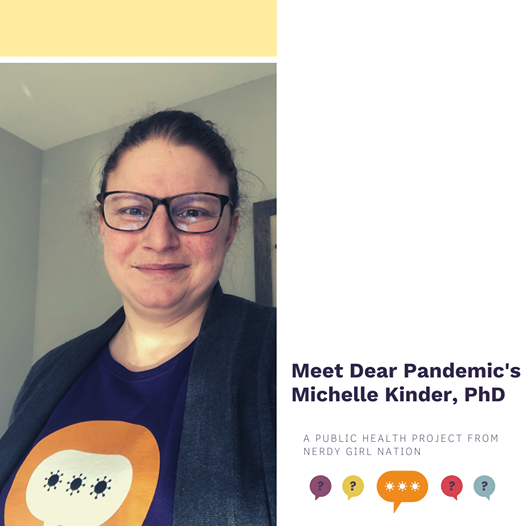This week in Meet Those Nerdy Girls, we’re delighted to introduce Dr. Michelle Kinder, PhD. Dr. Kinder is a PhD-trained immunologist working in industry, where she studies immunology and cancer drug therapies. 🧪
She volunteered to join the Dear Pandemic team last August!
We need to tell you right up front that what Dr. Kinder writes here at Dear Pandemic is her own opinion, and it does not represent her employer. At work, she doesn’t work on issues of COVID at all. In fact, that’s why she volunteered with us. She says that “One of the reasons I joined Dear Pandemic is to contribute to the conversation and education on COVID-19.”
And we’re *so* glad she did! You know her posts–they’re often the ones that talk about T-cells, antibodies, proteins, etc. In other words, stuff that happens inside the body. She also provides a lot of backchannel review for the rest of the team on matters of immune function and pharmacological treatments/vaccines, and we are eternally grateful for that.
Here’s what Dr. Kinder recently told us about her work, her life, and the pandemic.
❇️ What experiences led you to a PhD and a career in immunology?
“When I was 16, my grandmother had lung cancer. I told her that I would cure cancer for her…she corrected me to in memory of her. 💔 That experience led me to do cancer research while in college. I fell in love with Immunology after a course and decided to combine my interests to pursue Cancer Immunology for graduate school and beyond.”
❇️ Why did you reach out to be part of the Dear Pandemic team?
“I asked to join Dear Pandemic to share my Immunology knowledge and make a positive impact in these trying times. I think science advocacy to improve health literacy is so important–especially when misinformation is so rampant. I cannot control the pandemic but I can control what I can contribute to help others.”
❇️ What has been the most frustrating thing about the pandemic, from your point of view?
“The most frustrating part of the pandemic is the impact on my son’s mental health. He suffered a lot when daycare closed in the Spring. The summer was great because he went to camp but this year has been a struggle with virtual learning in kindergarten.”
❇️ What are you most proud of?
“I was part of a team that founded a nonprofit consulting group called BALSA. The group provides career development opportunities for scientists-in-training and low-cost consulting for biotechnologies companies in the St. Louis area.”
❇️ What you miss most from before the pandemic:
“Traveling”
❇️ What you don’t miss at all:
“Not having 6 feet of space when waiting in line. I hope to keep my space!” 🔙
❇️ If you had a do-over on the last 10 months, what would you do differently?
“In March and April when hospital numbers were rising, similar to other families of health care providers, I moved out of our house with my son. Knowing what I know now I would not move out. My spouse did not get COVID in March/April…..he got it in August.”
❇️ Superpower 🦸♀️:
“Metaphors!” [Editorial note: immunologists use more metaphors than any other scientific discipline. That’s a fact. See also: what is mRNA and the IKEA instruction manual analogy
❇️ Who is your hero?
“My hero is my grandmother. She was a union leader for many years. I think about how men and women both voted for her in the 1960s to represent them. Her mother died when she was born and she went back to Italy with family. She came back to America and had to learn English but then her stepmother died when she was still young. She ended up in an orphanage with her sister until her father could care for them again. She grew up to be resilient, funny and loving. One day I will write her story.” 💪
❇️ How do you manage stress?
“A glass of sparkling rose and a zoom happy hour with friends. 🍾 I also love running outside.” 🏃♀️
❇️ Fun fact: Dr. Kinder’s cat Boo meows constantly, steals human food and often sneaks onto zoom calls. In fact, he’s appeared on several of our Facebook Lives. 😺
Dr. Kinder earned an undergraduate degree in Biochemistry and Molecular Biology from Penn State and a PhD in Immunology from the University of Pennsylvania Perlman School of Medicine. She completed postdoctoral training at Washington University in St. Louis, and has been working in industry since completing her education. Today, her day job is working in immuno-oncology at a pharmaceutical company, where she performs research on new cancer therapies.



